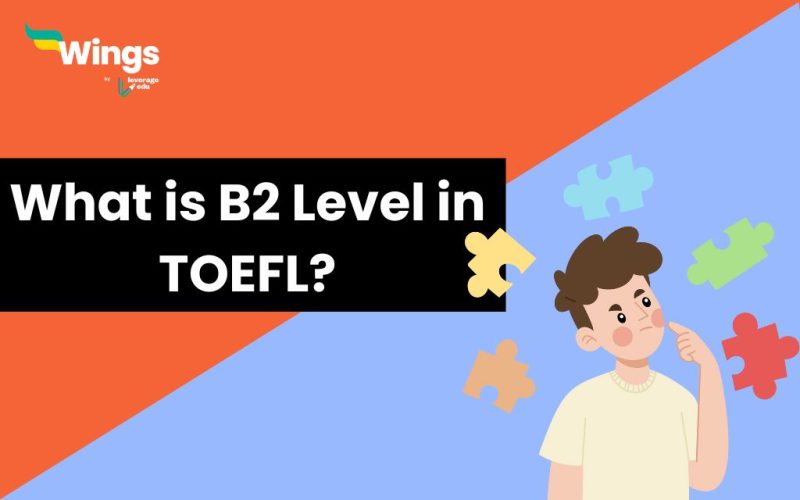Aspiring to study at prestigious universities abroad? Achieving a B2 score on the TOEFL exam stands as a crucial milestone.
This level signifies your ability to grasp the essence of academic texts, understand everyday spoken English, and navigate written material with a wide vocabulary.
Primarily, B2 TOEFL serves as a key to unlocking doors to studying at leading international institutions.
Essentially, a B2 level corresponds to a score range of 72-94 on the TOEFL. Read the complete article to gain comprehensive insights into the test and its requirements, paving the path towards your academic dreams.
This Blog Includes:
Understanding CEFR: What Exactly is the CEFR?
The Council of Europe’s Common European Framework of Reference for Languages (CEFR) presents a standardized, six-tiered structure for describing language proficiency across various European languages.
This framework enables consistent evaluation by learners and educators, promoting transparency and collaboration in language education and assessment.
The six levels, ranging from A1 (basic) to C2 (mastery), offer a clear and readily understood vocabulary for characterizing language skills, and facilitating effective communication and collaboration within the field.
What is the Purpose of CEFR? (H3)
The CEFR framework is used for:
- Measuring proficiency in various languages spoken in Europe.
- Establishing language proficiency benchmarks for both instructors and learners.
- Providing a common reference point for setting clear expectations and measuring progress in language acquisition.
- Assessing and validating the language proficiency of non-native speakers.
What Does a B2 Level in TOEFL Mean?
Students seeking B2-level proficiency on the TOEFL must acquire scores within the range of 72-94 in the TOEFL iBT exam.
Securing this level signifies a crucial milestone: the ability to confidently express oneself with eloquence in international settings.
This upper-intermediate proficiency demonstrates an individual’s capacity to articulate complex ideas and comprehend sophisticated written English.
Such B2 skills enable independent functioning in diverse academic and professional environments, albeit with some limitations in nuanced expression and precision.
How to Tell if You’re At A B2 level in English?
The Common European Framework of Reference for Languages (CEFR) has established itself as a widely recognized benchmark for measuring language ability.
Its six-tiered scale, ranging from the beginner level (A1) to mastery (C2), provides a clear and consistent tool for evaluating language skills across various contexts and languages.
Go through the table below to assess your CEFR level by corresponding your TOEFL iBT scores. This correlation allows individuals and institutions to readily translate TOEFL performance into the broader framework of CEFR proficiency, facilitating effective communication and accurate assessment.
| CEFR Level | TOEFL Score (iBT) |
| A1 | – |
| A2 | – |
| B1 | 42-71 |
| B2 | 72-94 |
| C1 | 95-113 |
| C2 | 114-120 |
What Can You Do with a B2 level in English?
While a B2-level TOEFL score signifies upper-intermediate English proficiency, it’s important to understand its strengths and limitations within diverse international contexts.
Individuals at this level excel in expressing themselves eloquently in academic and professional settings, effectively conveying complex ideas and navigating demanding written materials.
However, it’s important to acknowledge that B2 proficiency may not yet encompass the full scope of nuanced expression and stylistic mastery achieved at the C2 level. B2 speakers, while articulate and competent, might not yet possess the same degree of subtlety and precision as someone at the highest level of linguistic command, i.e., a C2.
Therefore, understanding the nuances of B2 proficiency enables both individuals and institutions to set realistic expectations and effectively evaluate language skills within the broader framework of international communication.
Individuals who have a B2 in English can:
- Comprehend the core crux of the written text on various topics and themes. Such individuals can confidently hold conversations and discussions on various issues.
- Eloquently converse with people without much hindrance.
- Articulately and concisely write text on a wide array of subjects. Produce strong arguments on various issues.
Related Reads:
| TOEFL iBT – Exam Dates, Fee, Eligibility, Preparation | TOEFL iBT vs. TOEFL PBT: Understanding the Differences | TOEFL Eligibility Criteria 2023: Check Qualification, Age |
| How to Prepare for NEW TOEFL Online: Study Guide 2023 | TOEFL Exam Pattern 2023: Check Revised Pattern & | Types of TOEFL Exam: IBT, ITP & CBT |
FAQs
Ans: Many students have a preconception that IELTS is easier than TOEFL. However, the answer is much more subjective. With ETS introducing the revised exam pattern, TOEFL proves to be a shorter exam with a lower application fee. You will also have an easier time with the shorter writing section in TOEFL. Hence, the revised TOEFL is much easier than IELTS in many aspects.
Ans: Those who want to study in reputable institutions overseas should strive for a TOEFL iBT score of 100 to 120.
Ans: There is no ordained set of credentials for taking the TOEFL Exam. The test requires that you have at least qualified for your class 10+2 boards from a reputable institution.
Visit the Leverage Live page of Leverage edu or contact our study abroad experts at 1800-57-2000 to strengthen your scores and application to secure your spot in your dream college.


 One app for all your study abroad needs
One app for all your study abroad needs












 60,000+ students trusted us with their dreams. Take the first step today!
60,000+ students trusted us with their dreams. Take the first step today!